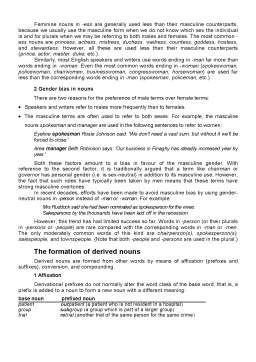Extras din curs
Gender: masculine, feminine, personal, and neuter
Gender is not an important grammatical category in English: unlike many European languages, English has no masculine and feminine inflections for nouns or determiners. Yet semantically, gender is an interesting and controversial topic: for example, how do English speakers distinguish between male, female, and male-or-female reference? Gender is also an area where the language is changing. This section discusses how to signal the gender of nouns and pronouns.
Four semantic gender classes can be distinguished:
example nouns pronouns
masculine Tom, a boy, the man he, him, his
feminine Sue, a girl, the woman she, her, hers
personal a journalist, the doctor who, someone
neuter a house, the fish it, what, which
• Masculine nouns and pronouns refer primarily to male people.
• Feminine nouns and pronouns refer primarily to female people.
• Personal gender nouns and pronouns refer primarily to people, regardless of whether they are female or male.
• Neuter gender nouns and pronouns refer primarily to inanimates (including abstractions).
However, there are special circumstances where the boundaries of these categories are fuzzy.
1 Masculine and feminine noun reference
There are four major ways of specifying masculine and feminine contrast in nouns:
• using totally different nouns:
father—mother son—daughter uncle—aunt man—woman bull—cow
• using derived nouns with masculine and feminine suffixes –er/or and -ess:
actor—actress waiter—waitress master—mistress
• using a modifier, such as male, female; man, woman, women:
male nurse female officer woman doctor male dancer women priests
• using nouns in -man, -woman:
chairman Englishman policewoman spokeswoman
(In writing, masculine nouns consisting of noun + man look like compounds, but in pronunciation, -man is more like a derivational suffix: it is pronounced /-mən/ in both the singular and the plural.)
The derivational endings –er/or and -ess are not of equal status. While -ess always has female reference, -er/or can be used for both sexes with personal gender words like doctor and teacher. Further, -ess can be added to a noun without -er/-or to form the female variant: lion—lioness; priest—priestess.
Feminine nouns in -ess are generally used less than their masculine counterparts, because we usually use the masculine form when we do not know which sex the individual is and for plurals when we may be referring to both males and females. The most common -ess nouns are princess, actress, mistress, duchess, waitress, countess, goddess, hostess, and stewardess. However, all these are used less than their masculine counterparts (prince, actor, master, duke, etc.).
Similarly, most English speakers and writers use words ending in -man far more than words ending in -woman. Even the most common words ending in -woman (spokeswoman, policewoman, chairwomen, businesswoman, congresswoman, horsewoman) are used far less than the corresponding words ending in -man (spokesman, policeman, etc.)
2 Gender bias in nouns
There are two reasons for the preference of male terms over female terms:
• Speakers and writers refer to males more frequently than to females.
• The masculine terms are often used to refer to both sexes. For example, the masculine nouns spokesman and manager are used in the following sentences to refer to women:
Eyeline spokesman Rosie Johnson said: 'We don't need a vast sum, but without it we'll be forced to close.'
Area manager Beth Robinson says: 'Our business in Finaghy has steadily increased year by year.'
Both these factors amount to a bias in favour of the masculine gender. With reference to the second factor, it is traditionally argued that a term like chairman or governor has personal gender (i.e. is sex-neutral) in addition to its masculine use. However, the fact that such roles have typically been taken by men means that these terms have strong masculine overtones.
In recent decades, efforts have been made to avoid masculine bias by using gender-neutral nouns in -person instead of -man or -woman. For example:
Mrs Ruddock said she had been nominated as spokesperson for the wives.
Salespersons by the thousands have been laid off in the recession.
However, this trend has had limited success so far. Words in -person (or their plurals in -persons or -people) are rare compared with the corresponding words in -man or -men. The only moderately common words of this kind are chairperson(s), spokesperson(s), salespeople, and townspeople. (Note that both -people and -persons are used in the plural.)
The formation of derived nouns
Derived nouns are formed from other words by means of affixation (prefixes and suffixes), conversion, and compounding.
1 Affixation
Derivational prefixes do not normally alter the word class of the base word; that is, a prefix is added to a noun to form a new noun with a different meaning:
base noun prefixed noun
patient outpatient (a patient who is not resident in a hospital)
group subgroup (a group which is part of a larger group)
trial retrial (another trial of the same person for the same crime)
Derivational suffixes, on the other hand, usually change both the meaning and the word class; that is, a suffix is often added to a verb or adjective to form a new noun with a different meaning:
base word suffixed noun
adjective: dark darkness
verb: agree agreement
noun: friend friendship
Preview document
Conținut arhivă zip
- Gender and Noun Formation.doc

























